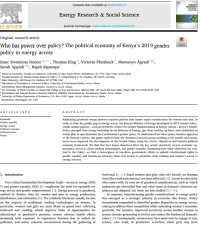Journal Article - July 2025
Who has Power over Policy? The Political Economy of Kenya’s Gender Policy in Energy Access
This new study, co-authored by three affiliates of the Energy Access Project, focuses on gendered energy poverty in Kenya and offers important insights into the intersection of gender, electricity access, and development outcomes. Particularly, the study explores the Gender Policy developed by the Kenyan Ministry of Energy, which put clean cooking up front, and established an action plan to operationalize the Constitution’s gender quota. The paper explores how the dynamics between actors working at the gender and energy
nexus have impacted the development of the Gender Policy using the Actors, Objectives and Context political
economy framework. Findings show that four major objectives drive the key actors: electricity access, economic opportunity, access to clean cooking technologies, and gender equality. Examining how these objectives are realized in the Policy, the study finds a convergence of top-down government efforts to uphold constitutional rights to gender equality and bottom-up advocacy from civil society to prioritize clean cooking and women’s access to energy services. The study also highlights the need for more trained gender experts in government ministries, increased funding for clean cooking awareness campaigns, and stronger support for women’s participation in energy education and leadership to advance gender equity goals.
